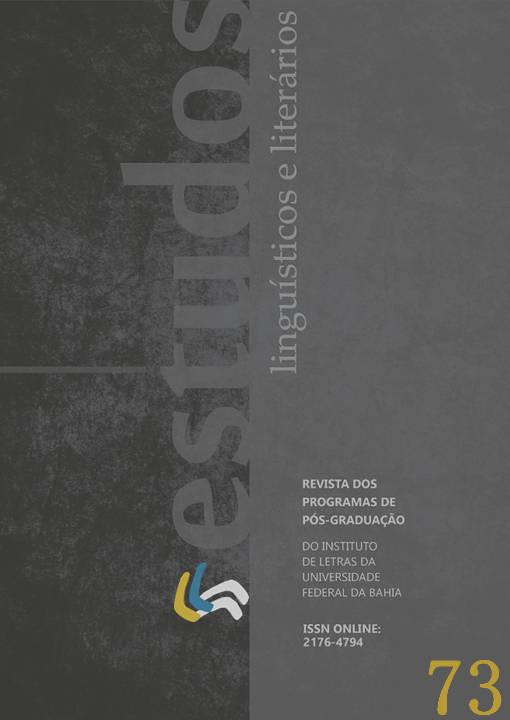INTRALINGUISTIC VARIATION AND PLURICENTRISM IN EDUCATION IN PORTUGUESE FOR THE 21ST CENTURY
DOI:
https://doi.org/10.9771/ell.i73.46700Keywords:
Pluricentrism, Intralinguistic variation, Portuguese language, Education in PortugueseAbstract
In this text, we present a systematic literature review aimed to understand the way students of Education perceive Portuguese language and to suggest guidelines for a didactic intervention capable of promoting its acknowledgement as a pluricentric language. The corpus which is analyzed consists of 8 texts published by researches involved in a project dealing with the conceptions of students of Education on Portuguese language and it was submitted to content analysis. The results revealed that the participants had some trouble acknowledging the importance of the intralinguistic variation of Portuguese language and consequently its existence as a pluricentric language, concepts which are discussed in the literature review. These conceptions and the attitudes related to them determine the need to promote a didactic intervention aimed for this public, within Education in Portuguese.
Downloads
References
ALARCÃO, Isabel; ARAÚJO E SÁ, Maria Helena. Era uma vez…a Didáctica de Línguas em Portugal: enredos, actores e cenários de construção de conhecimento. Aveiro: Universidade de Aveiro, 2010.
BANZA, Ana Paula. Uma língua; muitas vozes: para uma política linguística pluricêntrica do Português. In: HAßLER, G.; SCHÄFER-PRIEß. B. Contactos linguísticos na sequência da expansão portuguesa. Berlim: Peter Lang, 2020. p. 15-32.
BATORÉO, Hanna J. Que gramática(s) temos para estudar o Português língua pluricêntrica? Revista Diadorim / Revista de Estudos Linguísticos e Literários do Programa de Pós-Graduação em Letras Vernáculas da Universidade Federal do Rio de Janeiro. Rio de Janeiro, v. 16, p. 1-15, 2014.
CALVET, Louis-Jean. Mondialisation, langues et politiques linguistiques. 2002. Disponível em: [http:// www.gerflint.fr/Base/ Chili1/Calvet.pdf]. Acesso em: 04/10/2021.
CARDOSO, Teresa; ALARCÃO, Isabel; CELORICO, Jacinto Antunes. Revisão da Literatura e Sistematização do Conhecimento. Porto: Porto Editora, 2010.
CLYNE, Michael. Pluricentric Languages: Differing norms in different nations. Berlin/New York: Mouton de Gruyter, 1992.
ESPERANÇA, José Paulo. Uma abordagem eclética do valor da língua: o uso global do Português. Lisboa: ISCTE/Instituto Camões, 2009.
KLOSS, Heinz. Die Entwicklung neuer germanischer Kultursprachen seit 1800. Düsseldorf: Schwann, 1978.
MACÁRIO, Maria João; SÁ, Cristina Manuela. Pensa globalmente, age localmente: a literatura de potencial receção infantil na promoção da educação para a cidadania global. Indagatio Didactica, n. 12, v. 5, p. 47-61, 2020.
MARTINS, Guilherme d’Oliveira; GOMES, Carlos Alberto Sousa; BROCARDO, Joana Maria Leitão; et al. Perfil dos alunos à saída da escolaridade obrigatória. Lisboa: Ministério da Educação/Direção-Geral da Educação, 2017.
MATEUS, Maria Helena Mira. Difusão da Língua Portuguesa no mundo. In: Anais do I Simpósio Mundial de Estudos de Língua Portuguesa (SIMELP). São Paulo: USP-FFLCH, 2008, p. 1-13.
MENDES, Edleise. A promoção do português como língua global no século XXI. Linha d’Água, v. 32, p. 37-64, 2019.
MUHR, Rudolph. Non-Dominant Varieties of Pluricentric Languages. Getting the Picture. Frankfurt & Wien: Peter Lang, 2012.
OKOLI, Chitu. A guide to conducting a standalone systematic literature review. Communications of the Association for Information Systems, v. 37, n. 1, p. 879-910, 2015. Disponível em: [http://doi.org/10.17705/1cais.03743]. Acesso em: 04/10/2021.
RAPOSO, Eduardo Buzaglo Paiva; NASCIMENTO, Maria Fernanda Bacelar; MOTA, Maria Antónia Coelho; SEGURA, Luísa; MENDES, Amália. Gramática do Português. Vol. I e II. Lisboa: Fundação Calouste Gulbenkian, 2013.
REIS, Carlos; LABORINHO, Ana Paula et al. A internacionalização da língua portuguesa. Para uma política articulada de promoção e difusão. Lisboa, PT: GEPE, 2010.
RETO, Luís. Potencial económico da língua portuguesa. Alfragide: Texto, 2012.
SÁ, Cristina Manuela. Transversalidade da língua portuguesa: representações, instrumentos, práticas e formação. Exedra, n. 28, p. 364-372, 2012.
SÁ, Cristina Manuela. Ensino/aprendizagem da LP e perfil do aluno para o séc. XXI. Indagatio Didactica, v. 2, n. 10, p. 267-281, 2018.
SÁ, Cristina Manuela; MESQUITA, Luciana. Educação global através do ensino em Português língua materna: um percurso formativo. Educar em revista, v. 26, 2019. Disponível em: [https://www.scielo.br/j/er/a/DfsW6zCHxdFKKt9dMtXnSbP/?lang=pt]. Acesso em: 04/10/2021.
SÁ, Cristina Manuela; MESQUITA, Luciana. Abordagem transversal do ensino e aprendizagem da Língua Materna e promoção de uma educação para a cidadania global. Revista Cocar: Dossiê Pedagogia, didática e formação docente: velhos e novos pontos críticos-políticos, edição especial, n. 8, p. 315-332, 2020.
SÁ, Cristina Manuela; MESQUITA, Luciana. Educação em Português e cidadania global. Coleção Educação e Formação – Cadernos Didáticos, n. 7. Aveiro: UA Editora, 2020.
SOARES DA SILVA, Augusto. Pluricentricity: Language Variation and Sociocognitive Dimensions. Berlin & Boston: Mouton de Gruyter, 2014.
SOARES DA SILVA, Augusto. Variação linguística e pluricentrismo: novos conceitos e descrições. In: Actas do XIII Congreso internacional de Lingüística Xeral Vigo: Universidade de Vigo, p. 838-845, 2018.


